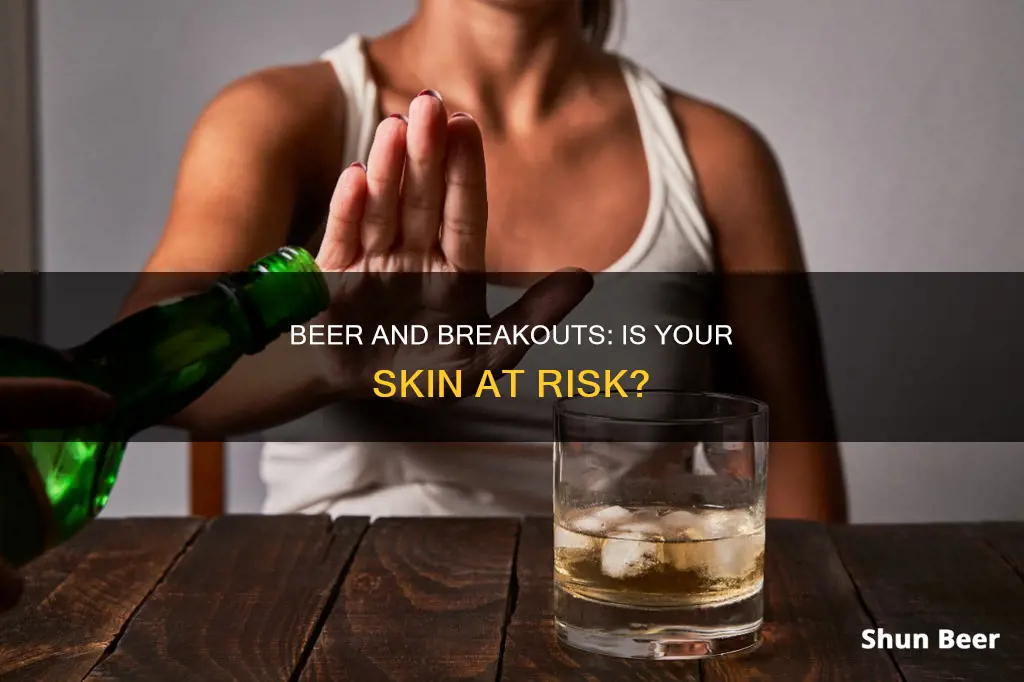
Alcohol is a diuretic, which means it increases urine production, flushing out more salt and water than usual. This can lead to dehydration, which in turn can cause dry skin. Dehydration can also make the skin look sunken or saggy. Alcohol also causes an imbalance in the hormones testosterone and estrogen, which can make you appear dull and pale. In addition, alcohol is processed by the body as a sugar, which can increase insulin levels and lead to acne breakouts. While there is no direct link between alcohol consumption and acne, alcohol affects many parts of the body and can influence skin health.
| Characteristics | Values |
|---|---|
| Direct cause of acne | No |
| Indirect cause of acne | Yes |
| Skin issues | Acne, Psoriasis, Rosacea |
| Skin repair | More difficult |
| Blood vessels | Dilated |
| Skin appearance | Redness, Inflammation |
| Immune system | Weakened |
| Dehydration | Yes |
| Oil production | Increased |
| Hormone levels | Imbalanced |
| Liver function | Adversely affected |
What You'll Learn
- Alcohol is a diuretic, causing dehydration and increased oil production
- Alcohol can cause hormonal imbalances, which can lead to acne
- Alcohol affects the immune system, making it easier for bacteria to infect the skin
- Alcohol can cause inflammation, a primary cause of acne
- Alcohol can lead to liver damage, impacting the removal of toxins

Alcohol is a diuretic, causing dehydration and increased oil production
Alcohol is a diuretic, meaning it increases urine output. This can lead to dehydration, which can have several negative effects on the body. When you drink alcohol, your body tends to produce more urine, and this can happen very quickly. Dehydration from alcohol consumption can cause the skin to become dry and can also lead to an increase in oil production.
Alcohol affects the body's ability to regulate water levels. The body has detectors that sense the saltiness and volume of water in the body. When the body is dehydrated, these detectors signal the posterior pituitary gland to release a hormone called vasopressin, or anti-diuretic hormone (ADH). ADH helps the body retain water by reducing urine output. However, alcohol interferes with this mechanism by reducing the production of ADH, leading to increased urination and dehydration.
Dehydration caused by alcohol consumption can have several negative effects on the body. Firstly, it can impact the skin, causing dryness and increasing the risk of skin disorders such as acne. This is because dehydration can affect the skin's ability to repair itself and make it more susceptible to bacteria. Additionally, alcohol can cause an imbalance in hormones such as testosterone and estrogen, which can also impact the skin.
Secondly, dehydration can affect the body's ability to flush out inflammatory toxins. This is because dehydration deprives the skin of vital vitamins and nutrients, making it more challenging for the body to eliminate toxins effectively.
Finally, dehydration can lead to increased oil production in the skin. This is because dehydration can trigger the body's oil glands to produce more oil, which can contribute to clogged pores and acne breakouts.
To prevent dehydration and mitigate its effects on the skin, it is important to drink plenty of water, especially when consuming alcohol. Additionally, washing your face regularly, avoiding greasy and sugary foods, and practising good skin hygiene can help maintain healthy skin.
Florida Driving: Beers and Legal Boundaries
You may want to see also

Alcohol can cause hormonal imbalances, which can lead to acne
Alcohol can have a detrimental effect on the skin, and while it does not directly cause acne, it can be a contributing factor. Alcohol is a diuretic, which means it increases urine production, and this can lead to dehydration. Dehydration can cause the skin to produce more oil, which can then lead to clogged pores and acne breakouts.
In addition, alcohol can cause hormonal imbalances, which can also trigger acne. Alcohol is known to affect testosterone levels in men, and a small study found that it can increase testosterone levels in women. Alcohol also influences oestrogen levels in women, increasing estradiol, a form of oestrogen. These hormonal changes can stimulate oil glands, leading to increased oil production, which can then clog pores and cause breakouts.
Alcohol also affects the immune system, reducing the number of protective cells in the body and making it more susceptible to infections such as Propionibacterium acnes (P. acnes) bacteria, which are known to cause cysts and pustules. While there is no direct link between alcohol and P. acnes, the relationship between the immune system, bacteria, and alcohol is significant.
Therefore, while alcohol does not directly cause acne, its effects on the body, including hormonal imbalances, can be a contributing factor to skin breakouts.
Golfing and Beer: A Match Made in Heaven?
You may want to see also

Alcohol affects the immune system, making it easier for bacteria to infect the skin
Alcohol can indeed cause skin breakouts, but it is not a direct cause. Drinking alcohol can trigger acne and other skin conditions such as psoriasis and rosacea. Alcohol is a diuretic, which causes dehydration, and this, in turn, can lead to dry skin and clogged pores. Alcohol also increases oil production in the skin, making it more susceptible to bacterial build-up.
Furthermore, alcohol naturally decreases the immune system, making it easier for bacteria to infect the skin. It impairs the function of testosterone and estrogen hormones, which can have an impact on the skin. Over-consumption of alcohol can lead to severe dehydration, depriving the skin of vital vitamins and nutrients. This can hinder the skin's ability to flush out inflammatory toxins, making it more vulnerable to infection.
In addition, alcohol can kill the good bacteria in the gut, allowing bad bacteria to grow unchecked, which can lead to problems with digestion, inflammation, and organ damage. It can also cause an imbalance in the gut microbiome, which is home to trillions of microorganisms that support overall health, including the immune system. This further increases the risk of infection, as the body finds it harder to fight off bacteria and viruses.
Therefore, while alcohol does not directly cause acne, it can contribute to several factors that can trigger breakouts and make the skin more susceptible to bacterial infections.
Ginger Beer: Healthy Beverage or Just a Refreshing Treat?
You may want to see also

Alcohol can cause inflammation, a primary cause of acne
Inflammation can occur due to many factors, including hormonal imbalances, certain autoimmune diseases, and dietary factors. Alcohol is processed by the body as a sugar, and high-sugar foods and beverages are known to trigger inflammation. Mixed drinks that contain sugary juices and syrups can increase the risk of inflammation.
In addition, alcohol can cause dehydration, which can also lead to acne breakouts. Alcohol is a diuretic, which means it increases urine production, flushing out more water and salt than usual. This can leave the skin dehydrated, causing the oil glands to produce more oil to compensate for the loss of water. Excess oil can clog pores and lead to acne breakouts.
Furthermore, alcohol can affect hormone levels, which can also influence acne development. Alcohol can increase testosterone levels in women and lower testosterone levels in men. It can also increase estradiol levels, a form of estrogen, in women. These hormonal fluctuations can stimulate oil glands and lead to increased oil production, which can contribute to acne.
While alcohol may not directly cause acne, its effects on the body, such as dehydration, immune system suppression, inflammation, and hormonal imbalances, can create an environment that promotes acne development and worsens existing acne. Therefore, if you suffer from acne, it is advisable to limit or avoid alcohol consumption to maintain healthy skin.
Prison Beer Drinking: Is it Possible?
You may want to see also

Alcohol can lead to liver damage, impacting the removal of toxins
Alcohol-related liver disease (ARLD) is caused by heavy alcohol consumption. The liver is responsible for breaking down alcohol, filtering toxins from the blood, and regulating blood sugar and cholesterol levels, among other functions. When the liver breaks down alcohol, a chemical reaction releases a toxin that damages liver cells. If the amount of alcohol ingested is more than the liver can process, it can lead to ARLD.
There are three main types of ARLD:
- Steatotic (fatty) liver: This is the most common form of ARLD and is characterised by a build-up of fat inside the liver cells, leading to an enlarged liver. It is often symptom-free but can cause upper abdominal discomfort.
- Alcoholic hepatitis: This is an acute inflammation of the liver that can be caused by long-term alcohol misuse or binge drinking. It is marked by the inflammation, swelling, and death of liver cells, which can lead to permanent scarring.
- Cirrhosis: This is the most severe form of ARLD and occurs when the entire liver is scarred, causing it to shrink and harden. This stage of ARLD can lead to liver failure, and the damage is usually irreversible.
The progression of ARLD can be prevented by reducing or stopping alcohol consumption. Abstinence from alcohol is the most critical step in treating ARLD, as the liver often has the capacity to heal and recover with complete alcohol avoidance. However, in severe cases, a liver transplant may be required.
The damage to the liver caused by alcohol abuse can have a significant impact on its ability to perform vital functions, including the removal of toxins from the blood. As the liver becomes damaged, its ability to regenerate and recover is compromised, leading to serious and permanent damage. This, in turn, affects the liver's capacity to filter and remove toxins from the body, impacting overall health and well-being.
How to Drink Beer: The Head Conundrum
You may want to see also
Frequently asked questions
Drinking beer doesn't directly cause acne, but it can trigger skin issues such as acne, especially if you're prone to breakouts. Alcohol can dehydrate your skin, causing your oil glands to produce more oil and making your skin more susceptible to bacteria.
Alcohol can cause inflammation and redness, as well as making it more difficult for your skin to repair itself. It can also lead to severe dehydration, which can have negative effects on the body and make the skin look sunken or saggy.
It's important to drink responsibly and in moderation. Staying hydrated by drinking plenty of water is key, and it's also a good idea to wash your face each night and remove all makeup.
Alcohol abuse is one of the leading causes of premature aging. Over time, excessive drinking can take a toll on your skin's health, causing wrinkles and other skin problems.







